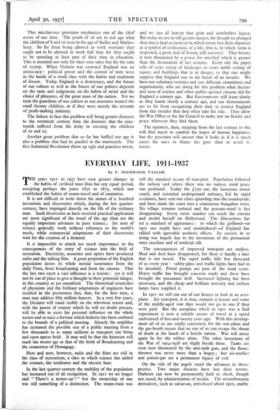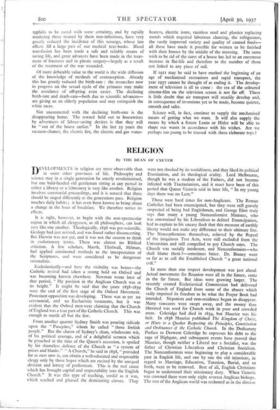EVERYDAY LIFE, 1911-1937
By F. SHERWOOD TAYLOR
It is not difficult to write down the names of a hundred inventions and discoveries which, during the last .quarter- century, have impinged directly on the life of the ordinary man. Such discoveries as have received practical application are more significant of the trend of the age than are the equally important advances in pure science ; for men of science generally work without reference to the world's needs, while commercial adaptations of their discoveries wait for the creation of a demand.
It is impossible to attach too much importance to the consequences of the entry of science into the field of recreation. Electricity, acoustics and optics have produced radio and the talking film. A great proportion of the English population draws its whole mental sustenance from the daily Press, from broadcasting and from the cinema. That the last two exert a vast influence is a truism : yet it will not be out of place to give a thought to their potential danger, in this country as yet unrealised. The theoretical researches of physicists and the brilliant adaptations of engineers have resulted in the portentous fact, that, for the first time, a man may address fifty million hearers. In a very few years, the Dictator will stand visibly on the television screen and, with the power of oratory which he will no doubt possess, will be able to exert his personal influence on the whole nation and so raise a fervour which hitherto has been confined to the bounds of a political meeting. Already the amplifier has increased the possible size of a public meeting from a few thousands to as many millions as transport can bring and open spaces hold. It may well be that the historian will mark the recent age as that of the birth of Broadcasting and the renascence of Demagogy.
Here and now, however, radio and the films are still in the class of recreations, a class to which science has added the crooner, the totalisator and the electric hare.
In the last quarter-century the mobility of the population has increased out of all recognition. In 1911 we no longer said " There's a motor-car ! " but the ownership of one was still something of a distinction. The steam-train was still the standard means of transport. Population followed the railway and where there was no station, rural peace was profound. Today the £150 car, the luxurious motor coach, and extended underground railways, fed by rapid escalators, have sent our cities sprawling into the countryside, and have made the coast into a continuous bungalow town. No village remains isolated and the peasant-mind is fast disappearing. Every rustic maiden can reach the cinema and model herself on Hollywood. The film-actress has set a standard of appearance : to which the girlhood—in 1911 one might have said maidenhood—of England has rallied with agreeable aesthetic effects. Its success in so doing was largely due to the inventions of the permanent wave machine and of artificial silk.
The consequences of improved transport are endless. Mud and dust have disappeared, for there is hardly a lane that is not tarred. The rapid traffic kills five thousand of us every year : safety-glass and traffic-lights have had to be invented. Petrol pumps are part of the rural scene. Heavy traffic has brought concrete roads and these have brought the pneumatic drill. Increased lighting has been necessary, and the cheap and brilliant mercury and sodium lamps have supplied it.
In 1911 we still ran out of our houses to look at an aero- plane. Air transport, it is true, remains a luxury and some of the middle-aged vow they would not go in one if they were paid. But the aeroplane which in 1911 was a frail experiment is now a reliable means of travel at a speed undreamed of five-and-twenty years ago. With this develop- ment all of us are vitally concerned, for the war-plane and the gas-bomb ensure that no one of us can escape the threat of death at the hands of a hostile nation. War will never again be for the soldier alone. The other inventions of the War of 1914-1918 are slight beside these. Tanks arc even now threatened by the anti-tank gun, and the flame- thrower was never more than a bogey ; but air-warfare and poison-gas are a permanent legacy of evil.
On the side of the angels stand the advances in thera- peutics. Two major diseases have lost their terrors. Diabetes can now be permanently held in check, though not cured, by administration of insulin. The arsenobenzene derivatives, such as salvarsan, introduced about 1910, enable syphilis to be cured with some certainty, and by rapidly rendering those treated by them non-infectious, have very greatly reduced the incidence of this scourge, whose late effects fill a large part of our medical text-books. Blood transfusion has been made a safe and reliable means of saving life, and great advances have been made in the treat- ment of fractures and in plastic surgery—largely as a result of the treatment of the war wounded.
Of more debatable value to the world is the wide diffusion of the knowledge of methods of contraception. Already this has greatly reduced the birth-rate : the researches now in progress on the sexual cycle of the primates may make the avoidance of offspring even easier. The declining birth-rate and death-rate—both due to scientific advances— are giving us an elderly population and may extinguish the white races.
Not unconnected with the declining birth-rate is the disappearing home. The reward held out to housewives by advertisers of labour-saving devices is that they will be " out of the house earlier." In the last 25 years the vacuum-cleaner, the electric fire, the electric and gas water- heaters, electric irons, stainless steel and plastics replacing metals which required laborious cleaning, the refrigeiator; the vastly improved variety and quality of canned foods— all these have made it possible for women to be finished with their houses by the middle of the morning. The same wish to be rid of the cares of a house has led to an enormous increase in flat-life and therefore to the number of those not linked to any piece of soil.
If 1911 may be said to have marked the beginning of an age of mechanised recreations and rapid transport, the year 1937 cannot be thought of as ending it. The develop- ment of television is all to come : the era of the coloured cinema-film on the television screen is not far off. There is little doubt that air transport will steadily develop and, in consequence of inventions yet to be made, become quieter, smooth and safer.
Science will, in fact, continue to supply the mechanised means of getting what we want. It will also supply the means by which a future Lenin or Hitler will be able to shape our wants in accordance with his wishes. Are we perhaps too young to be trusted with these elaborate toys ?



































































 Previous page
Previous page